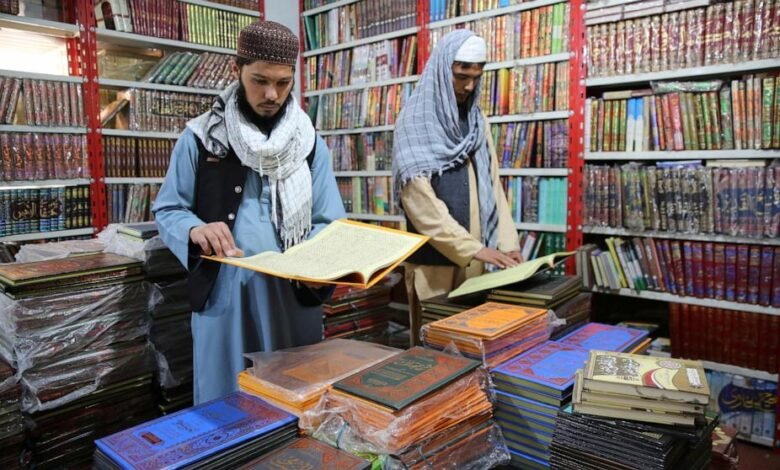Telephones, Islamic books and currency exchange. Some companies are making money from Taliban rule

KABUL, Afghanistan – Yunis Safi, a Kabul businessman, knows all too well the importance of showing off your phone if you want to get something done.
“In Afghanistan, your phone is your personality,” he said, smiling, a jewel-encrusted ring on each hand. One sports an emerald, the other a large Russian diamond. “When you go to a meeting with the government, the better your phone is, the more they will respect you.”
Safi runs a phone shop in the fashionable Shar-e-Naw neighborhood. An armed guard is outside. The iPhone 15 Pro Max graces store shelves, selling for $1,400. He has clients willing to part with this amount of money, which may come as a surprise to some, given the country’s economic problems and more than half the population that depends on humanitarian aid to survive.
Afghanistan’s finances were in shaky shape even before the Taliban took power in 2021. The budget depended heavily on foreign aid and corruption was rife. The takeover left Afghanistan’s economy in crisis, billions of international funds were frozen and tens of thousands of highly qualified Afghans fled the country and took their money with them.
But even in difficult conditions, some companies are making money from Taliban rule. However, women are reduced to customers as authorities have banned them from most jobs, including retail. None of Safi’s 78 employees are women.
It tapped a diverse consumer base – those eager for the latest iPhone release and those most satisfied with simple devices, which make up the majority of its sales and sell for between $20 and $200.
The Taliban often attacked phone towers and threatened telecommunications companies, accusing them of conspiring with the United States and other international forces to help track the insurgents’ movements through mobile phone signals. Now, they are investing in 4G mobile networks.
The Ministry of Communications states that 2 million new SIM cards have been issued in the last two years and that the number of subscribers is increasing. Ministry spokesman Enayatullah Alokozai said the government was investing $100 million in the telecommunications sector and had fully restored hundreds of towers.
There are 22.7 million active SIM cards in a country of 41 million inhabitants. Of these, 10 million are for voice calls and the rest for mobile internet.
According to data from the Ministry of Commerce, phone imports have increased. More than 1,584 tons of phones arrived in Afghanistan in 2022. Last year, there were 1,895 tons.
Safi said he has many Taliban customers and that it is younger people who prefer iPhones. “Of course they need smartphones. They use social media, they like to make videos. The iPhone has better security than the Samsung. The camera resolution, processor and memory are better. Afghans use their smartphones like everyone else.”
Safi has the iPhone 15 Pro Max, uses an Apple Watch Ultra and owns three cars.
Business was bad immediately after the Taliban took power, but is improving, Safi said. “The people buying the new iPhones are those with relatives abroad who send money to Afghanistan.”
Remittances are a lifeline, although they are less than half of what they were before the Taliban took power and the banking sector collapsed.
In Kabul’s noisy Shahzada Market, hundreds of money changers grab stacks of the local Afghan currency and noisily hawk their wares. They occupy every floor, staircase, nook and cranny.
Abdul Rahman Zirak, a senior foreign exchange official, estimates that $10 million changes hands daily. The diaspora mainly sends US dollars to families, who exchange them for Afghani.
There used to be more ways to send money to Afghanistan before the Taliban took control. But there are no longer any links to SWIFT or international banking and that is one of the main reasons why business is alive in the market, he said.
“The work of scalpers has increased and strengthened,” said Zirak. “Money transfers come from Canada, the US, Europe, Australia, Arab countries and other neighboring countries.”
Business is busy during the holidays. During the holy month of Ramadan, 20,000 people visited the market daily and it took more than 90 minutes to enter, he said.
“If sanctions are lifted and assets are unfrozen, then perhaps our business will decline. But I don’t see that happening. Many do not have bank accounts. Unemployment is high, so people send money to Afghanistan. Our business will be needed for years to come.”
Irfanullah Arif, who runs Haqqani Books, a store specializing in Islamic texts, is also optimistic about his fortunes. Most of his clients are teachers and students at religious schools, or madrassas.
There are at least 20,000 madrasas in Afghanistan. The Taliban want to build more. Last year, the supreme leader ordered the recruitment of 100,000 madrassa teachers.
While Arif’s business suffered like everyone else’s in the chaotic aftermath of the takeover, there was another reason. “All the students left the madrassas and went to work for the (Taliban) government,” Arif said.
The Taliban’s push for religious education provided him with some relief. Last year, he sold 25,000 textbooks.
But there is a price to pay for success. Arif imports everything and the Taliban are focused on collecting revenue, even in Islamic literature.
Arif pays a tax of 170 afghani ($2.36) for a box of 100 books, the shipping cost of which is 500 afghani ($6.95). Taxes on his bookstore tripled under Taliban rule.
“That’s why books are expensive in Afghanistan,” he sighed. “With the increase in madrassas, our trade increased, but so did taxes.”




